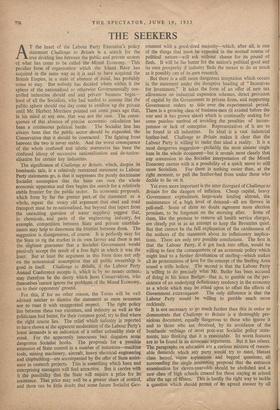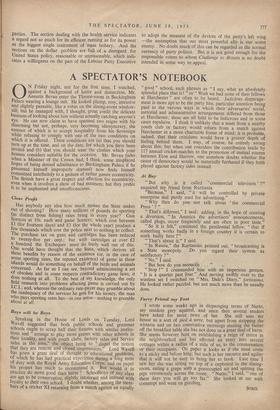THE SEEKERS
AT the heart of the Labour Party Executive's policy statement Challenge to Britain is a search for the true dividing line between the public and private sectors of what has come to be called the Mixed Economy. - This peculiar form of organisation which the Island Race has acquired in the same way as it is said to have acquired the British Empire, in a state of absence of mind, has probably come to stay. But nobody has decided where within it the sphere of the nationalised or otherwise Governmentally con- trolled industries should end and private business begin— least of all the Socialists, who had tended to assume that the public sphere should one day come to swallow up the private until Mr. Herbert Morrison pointed out some years ago that, in his mind at any rate, that was not the case. The conse- quence of this absence of precise economic calculation has been a continuous political battle. The Socialist line has always been that the public sector should be expanded, the Conservative that it should be contracted. The fighting front between the two is never stable. And the worst consequence of the whole confused and idiotic manoeuvre has been the Confused idiocy of successive nationalisation and de-nation- alisation for certain key industries.
The significance of Challenge to Britain, which, despite its bombastic title, is a relatively restrained statement as Labour Party statements go, is that it suppresses the purely doctrinaire Socialist assumption that the State can own the whole economic apparatus and then begins the search for a relatively stable frontier for the public sector. Its economic proposals, which form by far the greater part of the statement as a whole, repeat the weary old argument that steel and road transport must be re-nationalised, but beyond that (apart from the unexciting question of water supplies) suggest that, in chemicals, and parts of the engineering 'industry, for example, competition between State and private establish- ments may help to determine the frontier between them. The suggestion is disingenuous, of course. It is perfectly easy for the State to rig the market in its own favour and there is not the. slightest guarantee that a Socialist Government would passively accept the result of a free fight in which it was the loser. But at least the argument in this form does not rely on the nonsensical assumption that all public ownership is good in itself. Challenge to Britten, if the Labour Party Annual Conference accepts it, which is by no means certain,- may therefore be the decoy which lures Conservatives, who themselves 'cannot ignore the problems of the Mixed Economy, on to their opponents' ground.
For this, if for no other reason, the Tories will be well advised neither to dismiss the statement as mere nonsense nor to treat it with exaggerated respect. The right policy lies between these two extremes, and industry as well as the politicians had better, for their common good, try to find where the right course lies. The relief which industry is reported to have shown at the apparent moderation of the Labour Party's latest demands is an indication of a rather unhealthy state of mind. For the apparently innocuous bait disguises some dangerous Socialist hooks. The proposals for a possible extension of State control in a number of industries—machine tools, mining machinery, aircraft, heavy electrical engineering and shipbuilding—are accompanied by the offer of State assist- ance in research projects. This is something which keen and enterprising managers will find attractive. But it carries with it the possibility that the State will require a price for its assistance. That price may well be a greater share of control, and there can be little doubt that some future Socialist Gov- emment with a good-sized majority—which, after all, is one of the things that must be expected in the normal course of political nature—will ask without shame for its pound of flesh. It will be far better for the nation's political good and its own prosperity if industry finds the means to do as much as it possibly can of its own research.
But there is a still more dangerous temptation which occurs in the statement under the deceptive heading of " Incentives for investment." It takes the form of an offer of new tax allowances on industrial expansion schemes, direct provision of capital by the Government to private firms, and supporting Government orders to tide over the experimental period. There is a growing class of business-men (it existed before the war and it has grown since) which is continually seeking for some painless method of avoiding the penalties of incom- petence or lack of enterprise. Representatives of it are to be found in all industries. Its ideal is a vast industrial feather-bed. Challenge to Britain makes it clear that the Labour Party is willing to make that ideal a reality. It is a most dangerous suggestion—probably the most sinister single item in the whole document—but it reveals most clearly that any concession to the Socialist interpretation of the Mixed Economy carries with it a possibility of a quick move to still more Socialism. For there is nothing easier than, at the right moment, to pull the feather-bed from under those who decide to lie on it.
Yet even more important is the utter disregard of Challenge to Britain for the dangers of inflation. Cheap capital, heavy Government expenditure, large-scale lending abroad, the maintenance of a high level of demand—all are thrown in pell-mell. Some of them no doubt represent mere election promises, to be forgotten on the morning after. Some of them, like the promise to remove all health service charges, are clearly put in as an attempt to keep the Bevanites quiet. But that cannot be the full explanation of the carelessness of the authors of the statement about its inflationary implica- tions. There are only two possible conclusions. The first is that the Labour Party, if it got back into office, would be willing to face the consequences of an economic policy which might lead to a further devaluation of sterling—which makes all its protestations of love for the concept of the Sterling Area sound a trifle hollow. The second is that the Labour Party is willing to do precisely what Mr. Butler has been accused of doing in his latest Budget—that is, to gamble on the 'per- sistence of an underlying deflationary tendency in the economy as a whole which may be relied upon to offset the effects of Government extravagance. The only difference is that the Labour Party would be willing to gamble much more recklessly.
It is not necessary to .go much further than this in order to demonstrate that Challenge to Britain is a thoroughly per- nicious document, equally dangerous to those who ignore it and to those who are deceived, by its avoidance of the bombastic verbiage of most post-war Socialist policy state- ments, into thinking that it is reasonable. Its worst features are to be found in its economic arguments. But it has others. The paragraphs on education are a curious mixture of reason- able demands which any party would try to meet, blatant class hatred, vague aspirations and begged questions, all surrounding the single interesting proposal that the entrance examination for eleven-year-olds should be abolished and a new class of high schools created for those staying at school after the age of fifteen. This is hardly the right way to tackle a question which should permit of An agreed answer by all parties. The section dealing with the health service indicates a regard not so much for its efficient running as for its power as the biggest single instrument of mass bribery. And the sections on the dollar problem are full of a disregard for United States policy, reasonable or unreasonable, which indi- cates a willingness on the part of the Labour Party Executive to adopt the meanest of the devices of the party's left wing —the assumption that our most powerful ally, is our worst enemy. No doubt much of this can be regarded as the normal currency of party politics. But it is not good enough for the responsible voters to whom Challenge to Britain is no doubt intended in some way to appeal.



















































 Previous page
Previous page